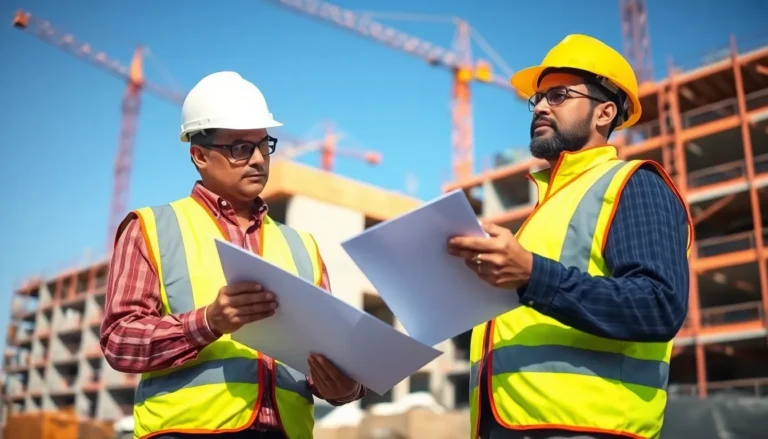Table of Contents
ToggleIn a world where dust bunnies seem to multiply overnight and coffee spills have a knack for finding the most conspicuous spots, cleaning staff are the unsung heroes of our daily lives. They wield mops and brooms like mighty swords, battling grime and chaos while we sip our lattes and scroll through social media. Without them, offices would resemble post-apocalyptic landscapes, and homes would be a maze of clutter.
But let’s face it—cleaning isn’t just about scrubbing floors and wiping surfaces. It’s an art form, a delicate dance of organization and sanitation. Skilled cleaning staff not only transform spaces; they create environments that promote productivity and well-being. So next time you see a cleaning crew, remember: they’re not just cleaning; they’re crafting a sanctuary from the everyday mess.
Importance Of Cleaning Staff
Cleaning staff play a crucial role in creating and sustaining clean environments. Their contributions significantly affect hygiene and overall health.
Role In Maintaining Hygiene
Cleaning staff ensure spaces remain free of dirt, dust, and pathogens. They frequently clean and disinfect surfaces that people touch daily, like doorknobs and countertops. Regular cleaning reduces the risk of illness. Staff must use appropriate cleaning supplies to combat bacteria and viruses effectively. Their efforts promote a hygienic atmosphere, which is essential in settings like hospitals, schools, and offices. Visible cleanliness encourages individuals to maintain good hygiene practices.
Impact On Health And Safety
Health hinges on maintaining clean surroundings. Cleaning staff actively reduce hazards by eliminating allergens and contaminants. They understand the significance of proper sanitation in preventing illness outbreaks. Regular cleaning routines minimize slip and fall accidents by removing debris and spills promptly. Cleaning crew members also enhance air quality by removing dust and pollutants, promoting a healthier environment. Their presence ensures compliance with health regulations, which benefits everyone in the building.
Types Of Cleaning Staff

Cleaning staff come in various forms, each fulfilling unique needs across different environments. Understanding these roles highlights their importance in maintaining cleanliness and hygiene.
Residential Cleaning Staff
Residential cleaning staff focus on household cleaning tasks. These professionals handle general cleaning duties such as dusting, vacuuming, and mopping. They often work on a schedule that suits homeowners, providing services weekly, bi-weekly, or monthly. Some residential cleaners specialize in deep cleaning or move-in/move-out cleanings. They create personalized cleaning plans based on individual preferences, ensuring spaces remain comfortable and inviting.
Commercial Cleaning Staff
Commercial cleaning staff manage cleaning in office buildings, schools, and industrial facilities. Their duties include maintaining cleanliness in high-traffic areas, disinfecting restrooms, and managing waste disposal. Many provide after-hours services to limit disruption to business operations. Staff often use specialized equipment and eco-friendly products to meet specific hygiene requirements. They follow established protocols to ensure compliance with safety regulations and enhance overall workplace hygiene.
Hiring Cleaning Staff
Hiring cleaning staff requires careful consideration of various factors to ensure a successful placement.
Qualifications To Look For
Experience in similar roles enhances the candidate’s potential effectiveness. Relevant certifications can indicate familiarity with specific cleaning techniques or safety protocols. Strong attention to detail is essential, as this trait ensures that thorough cleaning takes place. Reliable references from previous employers provide insights into the candidate’s work ethic and performance. Additionally, a background check may reveal any safety or compliance issues.
Interview Process
An effective interview process begins with a clear understanding of job requirements. Start by asking candidates about their previous cleaning experiences and specialized skills. Inquire about their approach to handling different cleaning challenges or uses of equipment. Questions on time management highlight candidates’ ability to work efficiently. Assessing their communication skills can determine how well they will cooperate with others. Finally, including a practical assessment allows observation of their cleaning techniques in action.
Training And Development
Training and development for cleaning staff plays a significant role in maintaining high standards of hygiene and efficiency. Focusing on essential skills equips them with the tools to excel in their roles.
Essential Skills Training
Essential skills training encompasses various techniques that enhance cleaning staff’s expertise. Proficiency in using cleaning equipment is crucial. Effective communication skills enable staff to coordinate with team members and report issues to supervisors. Understanding safety procedures helps prevent accidents and injuries. Attention to detail ensures thorough cleaning, particularly in critical areas. Hands-on training sessions provide practical experience, allowing staff to practice techniques under supervision. Structured training programs ensure consistent quality and help retain experienced staff, contributing to a reliable workforce.
Ongoing Professional Development
Ongoing professional development fosters continuous improvement within cleaning staff. Regular workshops offer new insights into cleaning products and best practices. Certifications in advanced cleaning techniques enhance staff credibility and career prospects. Peer reviews encourage collaboration and sharing of strategies among team members. Feedback sessions provide constructive criticism, helping employees identify areas for growth. Staying updated with industry trends allows staff to adopt innovative methods, ensuring workplaces remain clean and safe. Ultimately, investing in ongoing development helps organizations maintain high cleanliness standards and improve staff retention.
Challenges Faced By Cleaning Staff
Cleaning staff encounter various challenges that impact their work environment and overall job performance. Two prominent challenges include safety concerns and job satisfaction.
Safety Concerns
Safety concerns represent a major challenge for cleaning staff. Exposure to hazardous chemicals occurs regularly during cleaning tasks. Inadequate safety gear increases the risk of injuries, such as slips, falls, and cuts. Furthermore, they often work in high-traffic areas, making awareness of their surroundings essential. Implementing proper training on equipment use and safety procedures significantly mitigates hazards. Additionally, regular assessments of cleaning areas ensure compliance with health and safety regulations. Addressing these safety concerns helps create a more secure working environment for cleaning professionals.
Job Satisfaction
Job satisfaction significantly influences the productivity and morale of cleaning staff. Recognition for their hard work often remains scarce, leading to feelings of undervaluation. Opportunities for career advancement can also be limited, which affects motivation. Providing feedback and acknowledging accomplishments fosters a supportive workplace culture. Moreover, flexibility in scheduling caters to their personal needs, enhancing job satisfaction. Opportunities for skill development raise their confidence and competence in performing tasks. Overall, improving job satisfaction ensures a more positive atmosphere for cleaning staff, ultimately enhancing their effectiveness.
The importance of cleaning staff can’t be overstated. Their dedication and expertise create environments that promote health and productivity. By recognizing their contributions, individuals and organizations can foster a culture of appreciation that boosts morale and job satisfaction.
Investing in training and safety measures not only enhances the skills of cleaning staff but also ensures a safer workplace. This commitment to quality and well-being ultimately leads to cleaner spaces that benefit everyone.
As society continues to evolve, the role of cleaning staff will remain crucial in maintaining hygiene and safety standards. Acknowledging their efforts helps build a cleaner and healthier future for all.




